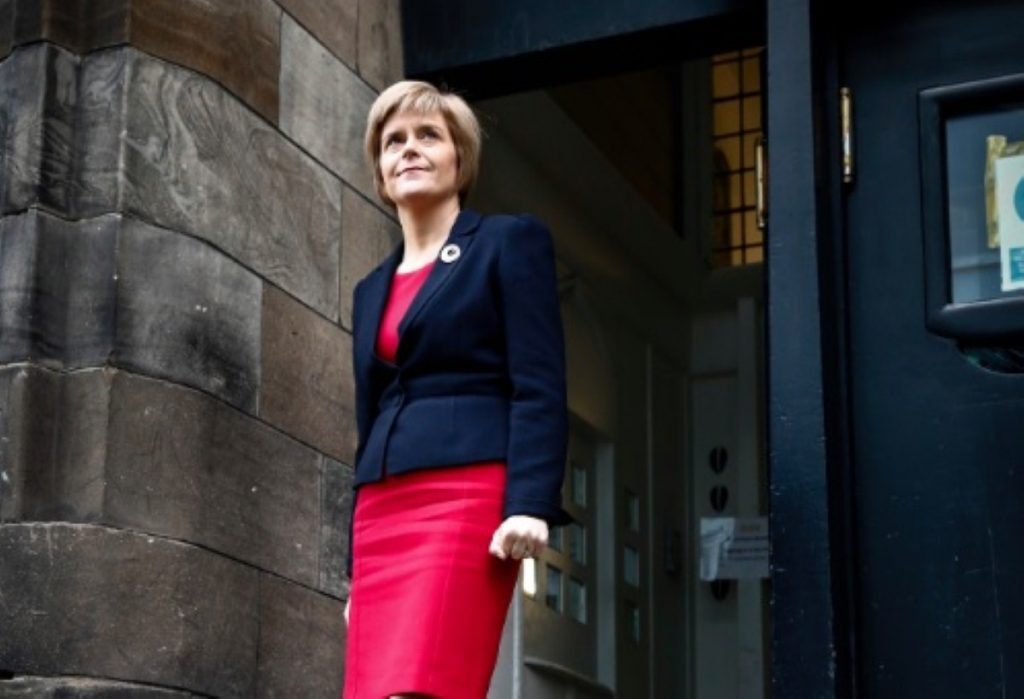An SNP landslide could save the Union
The pressure is on Ed Miliband to rule out any post-election deal with the SNP. With the Tories and Labour head-to-head and Lord Ashcroft's polling showing the nationalists claiming 50 of 59 seats north of the border, it's likely Nicola Sturgeon's party could be kingmaker on May 8th. This would almost certainly take the form of confidence-and-supply agreement, rather than an outright coalition, which Ed Balls has pretty much ruled out. But it's enough to put the frighteners on London.
And so the hysterics begin. John Major's is the most newsworthy. The former prime minister took to the Telegraph to call Miliband "shameful" for not turning his back on the SNP. It is "a tragedy in the making", he frets. In the Mail, Max Hastings warns of "the terrifying prospect of the Scots ruling England". In the Times, Philip Collins demands that "Labour must rule out a deal with the SNP".
Miliband is also under pressure from Scottish Labour to rule out a deal, so they can make the argument that voting SNP lets in David Cameron. That's all Scottish Labour has to offer now: pessimism, negativity and cynicism.
Their failures of reasoning are at once moral, strategic, political and intellectual. A deal between Labour and the SNP would not threaten the union: it strengthens it. If the argument over independence was about anything, it was that we were better together. That was, after all, the name of the campaign. It does not mean that the English rule the Scots, as Hastings appears to believe, like some sort of vassal class. It means that Britain works out its problems together, without scurrying away into regional identities.


If Scots are voting for the SNP in such numbers as to give them kingmaker status, then they are entitled to it by virtue of being elected in those numbers by our fellow Brits. For Miliband to come out now and rule out a pact with the SNP would be a profoundly disrespectful and undemocratic manoeuvre. It is this type of behaviour which is the real threat to the Union. It plays into the very perception of Westminster which the SNP promoted during the election campaign: lofty, arrogant and dismissive.
Instead, working with the SNP in Westminster shows the union works. It shows voting in Westminster elections gives Scots power in Britain. They are not some forgotten corner of the country. They are a key part of its democratic society.
Even if one were to take a Machiavellian strategic approach, a pact would be potentially beneficial. Playing a key role in Westminster puts the SNP in a precarious position. Sure, they could – and likely will try to –cement division between Scots and English. But they will also be associated in turn with what happens in London. The ideal political position the SNP enjoys – of being incumbent and opposition all at once – will substantially fade. Their seemingly endless rise as a political force will be much more nuanced. It won't be the same as the Lib Dems, but it will go some way to complicating their proposition. London cannot be a faraway place responsible for all Scotland's ills if you are partly responsible for what is going on there, even under an arm's-length confidence-and-supply arrangement.
The success of the SNP during the referendum was not based on national sentiment, but politics. A substantial majority of Scots consider Britishness part of their identity. It was an anti-Westminster movement, not an anti-British one. The nationalists simply proved canny at utilising that sentiment for their own purposes. That is a reassuring fact for those who believe in the United Kingdom. A political problem has political solutions.
If Scottish political will changes Westminster it will do more to keep our nations together than anything ever accomplished by those demanding we ignore the wishes of our fellow citizens. And it may not even do us much harm to have some of the frenzied, idealistic political momentum south of the border which Scots experienced last year.
If the people of Scotland vote SNP in the numbers we're expecting, it would go against the principle of the Union to deny that voice influence in Westminster.












